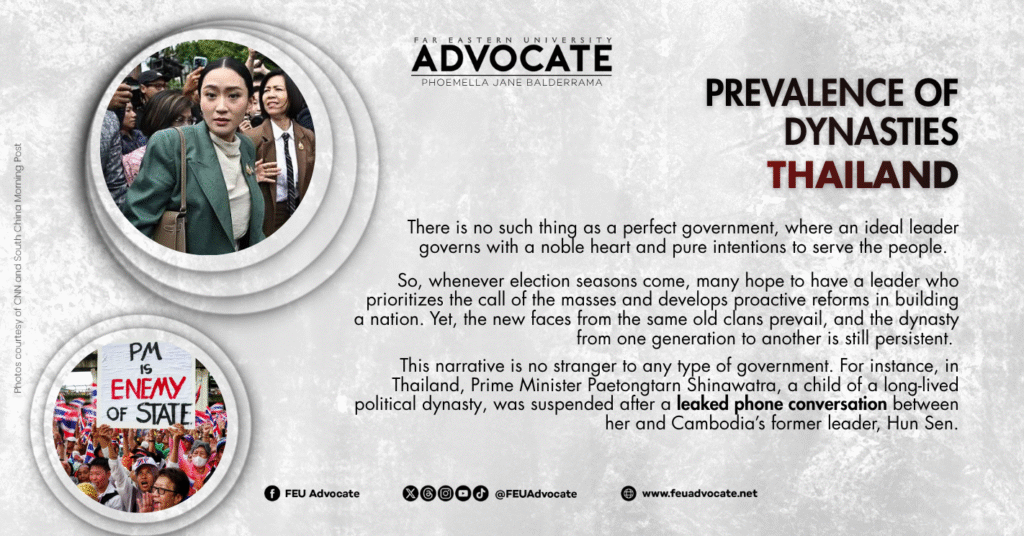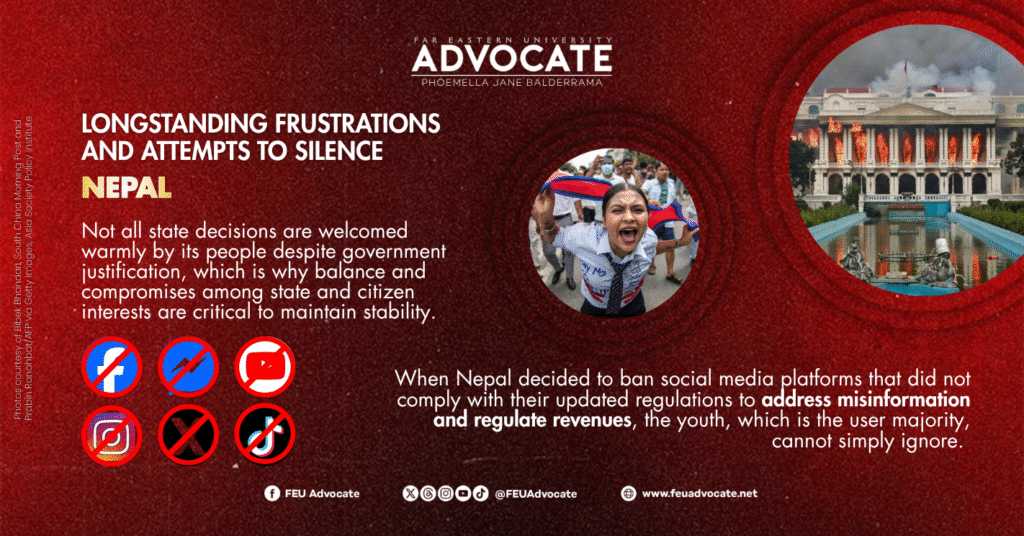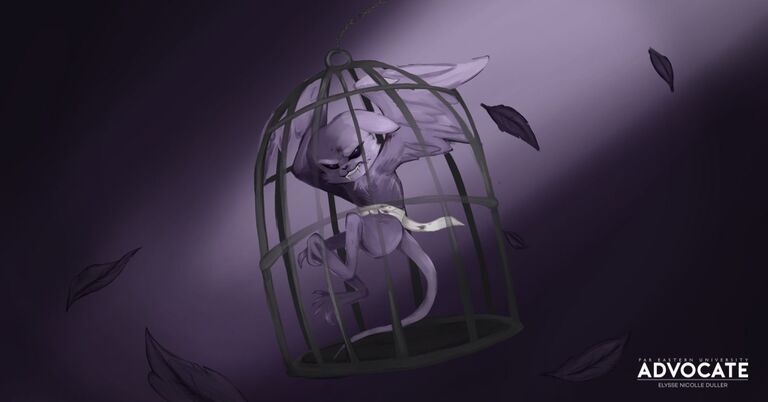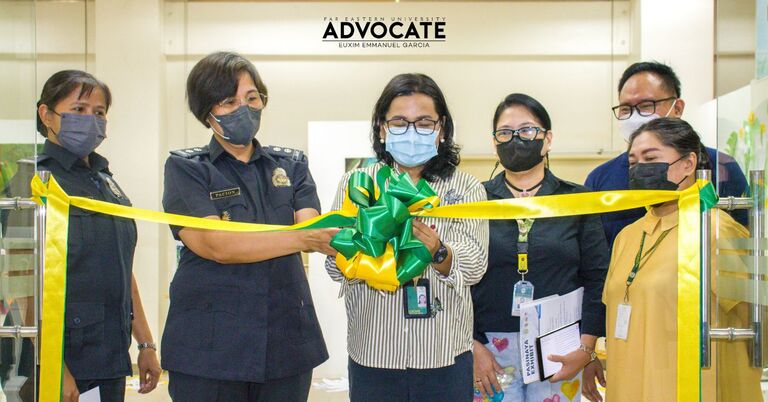
Pagpapasan sa naudlot na rebolusyon ni Andres Bonifacio
- November 30, 2024 16:09
FEU Advocate
November 15, 2025 17:20

By Eunhice Corpuz and Julliane Nicole Labinghisa
Fraudulence, betrayal, and oppression fuel a simmering rage that echoes through the agony and misery of the marginalized sectors. This pattern has spurred movements in countries, including Indonesia, Nepal, and Thailand, where citizens seize the opportunity to hold politicians accountable publicly. Meanwhile, the Philippines faces the same crisis, yet its approach to accountability is from collective stances but is modeled as a mere public stunt.
Good governance must be something that is received and felt by the nation, where its public officials guide the country’s future and ensure that citizens have equitable and efficient opportunities to enjoy, resulting in a good quality of life and reliable public service.
However, greed continues to corrupt the corners of reform, welfare work, and law enforcement. This self-serving corruption leads to distress and deep unfairness among the most vulnerable members of society.
Consequently, the marginalized community receives an unequal distribution of benefits, which causes the sectors that need support the most to suffer. For instance, the allocation of the budget in every sector is not equitably reasonable and is yet to be felt by society.
This emotion circulates through the poorest of the poor, as they try to navigate where to seek help in a pothole of ill-gotten wealth and incompetent leadership.
Despite stemming from different backgrounds, class struggle exacerbated by living conditions brought by poor governance pushes people to struggle in making ends meet, with resentment now tying them together against the government that fails to be of service despite it being the reason for their existence.
With this, the citizens from Indonesia, Nepal, and Thailand expressed their anger, exhausting all means to prosecute corrupt politicians, with the Philippines braving through a similar fight against tyranny and for accountability.

Gap between the social classes
Every day, minimum wage earners strive to meet their labor quotas to provide for their families and live with integrity, no matter how challenging their battles are.
These constant hardships for those at the bottom of the economic chain fueled the protesters’ fury when they discovered that their hard-earned money is being used to support the lives of the elite.
In Indonesia, this led to massive protests against the increase in housing allowances for lawmakers, which amounted to 50 million rupiah, an amount ten times of Indonesia’s capital city Jakarta’s average monthly minimum wage of 5,396,760 rupiah.
Then, the rage of every protester was enlivened when Affan Kurniawan, a rideshare driver, met his death after being tragically run over by a police officer during the rallies. His death sparked long-standing calls for justice and a fight against police brutality, tied within the nation’s current status quo, prevalent with corruption and political interference.
As a result, additional mass gatherings and riots took place in various cities throughout Indonesia. For instance, one of the cities that witnessed the chaos was Makassar, where a regional parliament building was burned down by the protesters last August 29.
In response, Indonesian President Prabowo Subianto and Chief of Police General Listyo Sigit Probowo responded with an apology upon Kurniawan’s death. Furthermore, Subianto stated that addressing the issues of corruption and police violence would contribute to financial stability.
He did, however, stress that when public property is damaged, the state acts to protect and serve the people.
Nevertheless, one cannot blame the protesters in Indonesia for creating a menace. The anguish and betrayal felt by every victim of corruption and impunity serve as a valid indictment against a government whose public service has become nothing more than a public stunt.
Meanwhile, similar chaos erupted in the streets of Mendiola, Manila, where tear gas was thrown, water cannons were used to bomb the protesters, and police brutality persisted.
Furthermore, the report of a victim, Eric Saber, a passer and was on the way home shot dead in Recto, Manila, directly contradicts Department of the Interior and Local Governance Secretary Jonvic Remulla's claim that no casualties were found.
The chaos that occurred in the streets of Mendiola and in Indonesia aligns with the victims of corruption's demand for the involved politicians to be held accountable.
Regardless of the differences, street rallies function as a critical mechanism for the public to maintain pressure on the government, signaling a sustained demand to confront anomalies and impunity among public officials.

Prevalence of dynasties
Every time elections come, many hope to name a leader who develops proactive reforms in building a nation. Yet, the new faces from the same old clans prevail, and the dynasty from one generation to another continues to dominate.
For instance, in Thailand, a child of a long-lived political dynasty and Thailand Prime Minister Paetongtarn Shinawatra faced suspension after a leaked phone conversation between her and Cambodia’s former leader, Hun Sen.
Subsequently, Hun Sen revealed that he recorded the call and shared it with 80 other public officials, and it was later leaked online.
On the phone call, Paetongtarn dismissed the Thai army by saying that they ‘just want to look cool’ and told Hun Sen to ignore them while there was an ongoing border dispute between Cambodia and Thailand.
After the news broke out, several movements were created to protest and urge the Prime Minister to step down, condemning this simple gesture of neglect from their leader as a sign of disrespect for the army’s role in defending the border and managing national security issues.
This collective call was heeded when the senators filed a petition to prosecute the prime minister’s alleged unprofessionalism. Additionally, the Constitutional Court ruled that Paetongtarn’s behavior constituted serious ethical misconduct and accentuated her connection with Hun Sen over national interest.
This suspension of their leader is a sign that the nation has a unifying call and criticizes the wrongdoings of its public officials, even if she holds the highest position.
Moreover, former Prime Minister Thaksin Shinawatra, the father of Paetongtarn, faces a political trial, sentencing him to one year in jail as ordered by the Thai Supreme Court. After his hospital stay was tagged as unlawful, the court ruled an extent of jail service. Yet, Thaksin evaded his eight year sentence through voluntarily exile.
The court deemed that the hospital stay of Thaksin was unlawful since his condition was neither critical nor an emergency.
Hence, the continued pressure on the Shinawatra dynasty demonstrates visibility among the public and political demand for accountability. Additionally, it shows how an efficient functioning justice system works, where even if the perpetrator holds the highest rank in the nation, they are prosecuted.
Meanwhile, in the Philippines, political dynasties are well-established within the government structure, where the same political clans hold positions as public officials. Most notably, the son of the late, ousted dictator now holds the nation’s highest office, illustrating a cyclical return to authoritarian roots.
Notably, the mere existence of the established dynasty shows that citizens habitually vote for these same public officials, leading to a weakened electoral competition where the position of power is treated more as an inherited throne than building public service.
For instance, when President Marcos Jr. took office in 2022, it served as a compelling case in the endurance of deeply rooted political dynasties in the Philippines. Despite his family’s historical accountability for large-scale human rights violations and ill-gotten wealth acquisition during Martial Law, they still remain in power.
His victory demonstrates the efficacy of historical revisionism, where the family’s effort to reframe the dictatorship as the nation’s “golden era” influenced contemporary electoral behavior, resulting in the weakening of accountability mechanisms that should have otherwise impeded the return of such personalities associated with grave abuse.
The contrasting political behaviors between Thailand and the Philippines, the Thai people's sustained civil action actively challenged governance. While Filipinos restored a dynastic figure associated with past authoritarianism, it highlights a variety of approaches to political accountability.
This pattern of political dynasty continues to contribute to a cyclical political environment where electoral competition is weakened and the public’s engagement with governance is often characterized by passive expectation rather than the active, critical demand for institutional reform.

Long-standing frustrations and attempts to silence
Not all state decisions are welcomed warmly by its people despite government justification, which is why balance and compromises among state and citizen interests are critical to maintaining stability.
But when policies collide with public frustration from issues of corruption and censorship, what may seem like only a small flame can spark a nationwide movement.
To reportedly address misinformation and regulate revenues, Nepal decided to ban social media platforms that did not comply with its updated regulations.
The policy then sparked nationwide movements participated by thousands of Gen Zs, seeing the media ban as a limit of their expression of dismay from persistent government corruption and anomalies that Nepali are experiencing.
Fueling the outrage are the ‘nepo kids’ who enjoyed lavish lifestyles—the complete opposite of what is experienced by regular citizens.
Similar to the Philippines, these nepo kids basked in their connections and money brought by their family ties while normal citizens suffered from poor political decisions, leading to economic and social hardships.
Among the Filipino nepo kids is Claudine Co, a niece of a contractor involved in the anomalous flood control projects, who received intense backlash due to her act of flaunting her family’s wealth on social media platforms.
Moreover, from the series of protests in Nepal that started on September 8, more than 70 individuals have been killed in the violent clashes between the protesters and police. The numbers continuously rose, but it did not stop them from getting involved.
Soon enough, the demonstrations yielded a result when Nepali Prime Minister KP Sharma Oli stepped down, which was responded to by the protesters with burning of government buildings, including Singha Durbar, which houses the Prime Minister’s office and the parliament.
The outrage from the people showed how people can only take so much anomalies. After the series of conformity and oppression faced, an end to wrongdoing must be sought, and those accountable must be held responsible.
It was not only social media that was banned, but even the years worth of suffering were silenced along with the application restriction, which was the main platform used to call out the misbehavior of politicians.

Flood from rain and corruption
Upon the discovery of the fraudulent flood control scheme, the tides of betrayal and cries of anguish start to rise as the victims seek justice and accountability in every possible way.
Being geographically situated in a location that welcomes roughly 20 tropical cyclones per year, immense downpours and heavy flooding are not new for its citizens.
From typhoons to earthquakes, natural calamities instilled resilience within the Filipinos, embodying the ability to withstand disasters and rise again.
However, when drizzles submerge roads, turning cities into rivers despite the existence of flood control projects all over the country, people can no longer tolerate it.
The budget supposedly allotted to improve flood infrastructures went to funding the lavish lifestyles of the corrupt and their families, bringing the clamor and anger from social media to the streets.
It revealed the great divide between social classes. While students and employees have no choice but to brave through flooded streets and get stranded in public areas with their safety at stake, children of politicians are able to travel around the world and buy luxury items using taxpayers' money.
Joined by tens of thousands of outraged individuals all over the country, people from different backgrounds assembled to demand transparency and accountability over the funds stolen from them.
Yet, what started as a peaceful mobilization led to encounters between protesters and the police, with more than 200 individuals arrested, including minors and students, who allegedly turned violent.
In addition, reports on human rights violations surfaced from the September 21 encounters, with even media personnel, journalists, and youth leaders experiencing such oppression and violence.
It was not only the trillion-pesos worth of flood control projects that were stolen from the people, but also the chance for an improved living condition where no compromises are made in different sectors due to a faulty system.
Suffering does not remain isolated within states but rather, felt by people regardless of origin, experiencing hardships due to the conditions exacerbated by poor politics and corrupt behavior.
Responses to these conditions vary from individual experiences. From peaceful mobilizations to violent-leaning approaches, one cannot belittle and dictate the way individuals deal with the anomalies, especially when they have experienced injustices firsthand. The involvement of youth in the clamor and initiatives reveals that despite the tough battle to be fought in judicial courts, street protests, or dialogue exchange over platforms—no external conditions could ever hinder their commitment to demand accountability and an end to the problems that infest the community.









